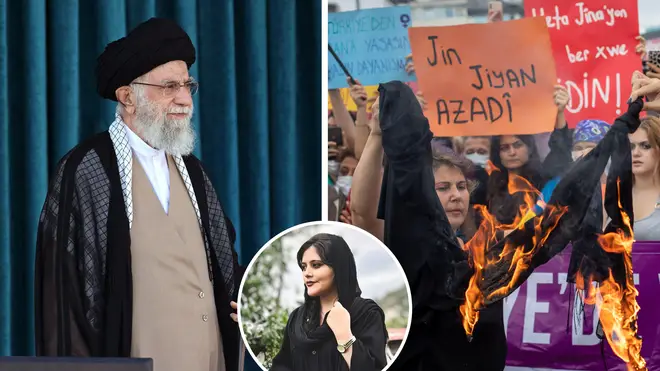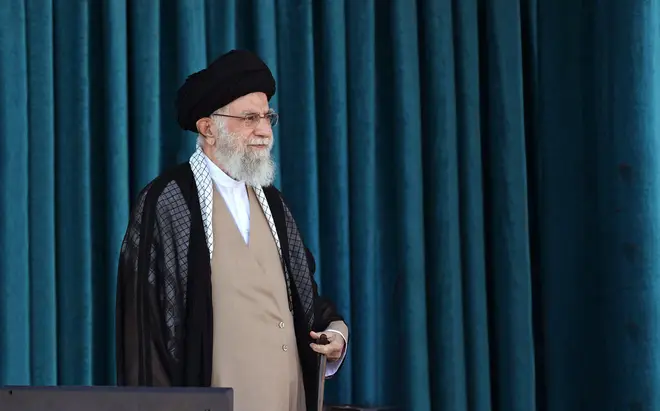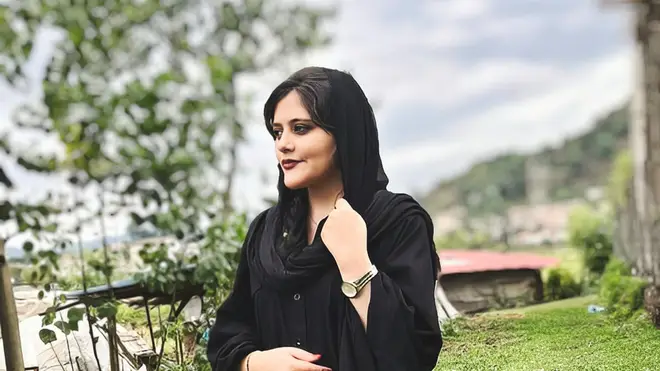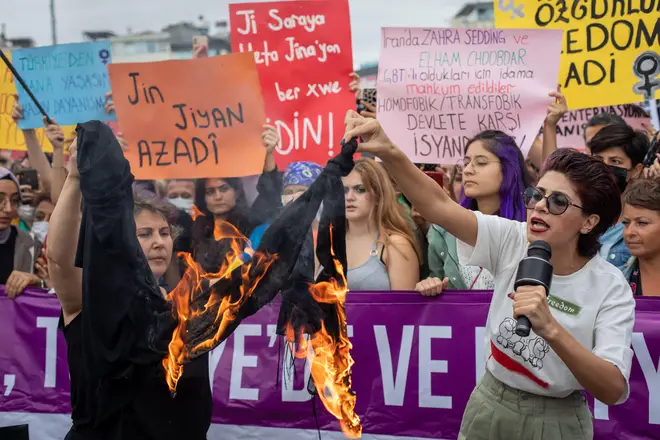
Ian Payne 4am - 7am
3 October 2022, 17:48

The Iranian supreme leader has said he is "heartbroken" by the death of 22-year-old Mahsa Amini in morality police custody - but blamed the US and Israel for violent protests that have erupted across the country since.
Ms Amini, a student, was arrested by police for allegedly not wearing the hijab in accordance with the government's strict standards.
She died in custody in Tehran, with her family claiming she was beaten - but officials claimed the 22-year-old died of a heart attack.
The incident has sparked protests against the Islamic Republic's treatment of women, both in the country and across the world.
Read more: Cyclist 'murdered' by four men who chased him down the street after he collided with their car
Iran's supreme leader Ayatollah Ali Khamenei has today publicly responded to the disorder, saying Ms Amini's death "left us heartbroken" but claiming the unrest on the US and Israel.
"This rioting was planned," he told a cadre of police students in Tehran.
"I say clearly that these riots and insecurities were designed by America and the Zionist regime, and their employees."
Mr Khamenei said the protests were planned by people who are "not ordinary Iranians" and said citizens were "defenceless against thuds, robbers and extortionists" because people were attacking police.

It comes after Iran's parliamentary speaker warned protests could destabilise the country, and urged security forces to deal harshly with those who he said endanger public order.
Mohammad Bagher Qalibaf told legislators that unlike the current protests, which he said were aimed at toppling the government, previous demonstrations by teachers and retirees over pay were aimed at reforms.
"The important point of the (past) protests was that they were reform-seeking and not aimed at overthrowing (the system)," he said.
"I ask all who have any (reasons to) protest not to allow their protest to turn into destabilising and toppling (of institutions)."
Read more: Britain faces blackout: 'Significant risk' of UK gas supply emergency, energy regulator warns
Read more: Man to stand trial next year accused of murdering Olivia Pratt-Korbel, nine, in Liverpool
Posts on social media showed there were scattered anti-government protests in Tehran and running clashes with security forces in other towns on Sunday, even as the government moved to partly or entirely block internet connectivity and access to social media apps.
Protesters are venting their anger over the treatment of women and wider repression in the Islamic Republic.
They have also tapped into a deep well of grievances including the country's surging prices, high unemployment, social restrictions and political repression.
They rapidly escalated into calls for the overthrow of the clerical establishment that has ruled Iran since its 1979 Islamic revolution.
Demonstrations against Ms Amini's death have also taken place in other countries including Turkey, Lebanon, France and the UK.
Iranian state TV has reported that at least 41 protesters and police have been killed since the demonstrations began on September 17.
An Associated Press count of official statements by authorities tallied at least 14 dead, with more than 1,500 demonstrators arrested.

Mr Qalibaf is a former influential commander in the paramilitary Islamic Revolutionary Guard.
Along with the president and the head of the judiciary, he is one of three ranking officials who deal with all important issues of the nation.
The three meet regularly and sometimes meet with MR Khamenei, who has final say on all state matters.
Mr Qalibaf said he believes many of those taking part in recent protests had no intention of seeking to overthrow the government in the beginning and claimed foreign-based opposition groups were fomenting protests aimed at tearing down the system.
Iranian authorities have not presented evidence for their allegations of foreign involvement in the protests.
"Creating chaos in the streets will weaken social integrity, jeopardising the economy while increasing pressure and sanctions by the enemy," Mr Qalibaf said, referring to long-standing US sanctions on Iran.
He promised to "amend the structures and methods of the morality police" to prevent a recurrence of what happened to Ms Amini.
His remarks came after a closed meeting of parliament and a brief rally by lawmakers to voice support for Khamenei and the police, chanting "death to hypocrites", a reference to Iranian opposition groups.
The statement by Mr Qalibaf is seen as an appeal to Iranians to stop their protests while supporting police and the security apparatus.

Meanwhile, the hard-line Kayhan daily newspaper said on Sunday that knife-carrying protesters attacked the newspaper building Saturday and shattered windows with rocks. It said they left when Guard members were deployed to the site.
Protests resumed on Sunday in several cities including Mashhad, according to social media reports, and Tehran's Sharif Industrial University, according to the semi-official Tasnim news agency.
Witnesses said security was tight in the areas nearby Tehran University and its central areas as hundreds of riot police and plain clothes officers were stationed on junctions and squares.
Ms Amini was an Iranian Kurd and the protests first erupted in Kurdish areas.